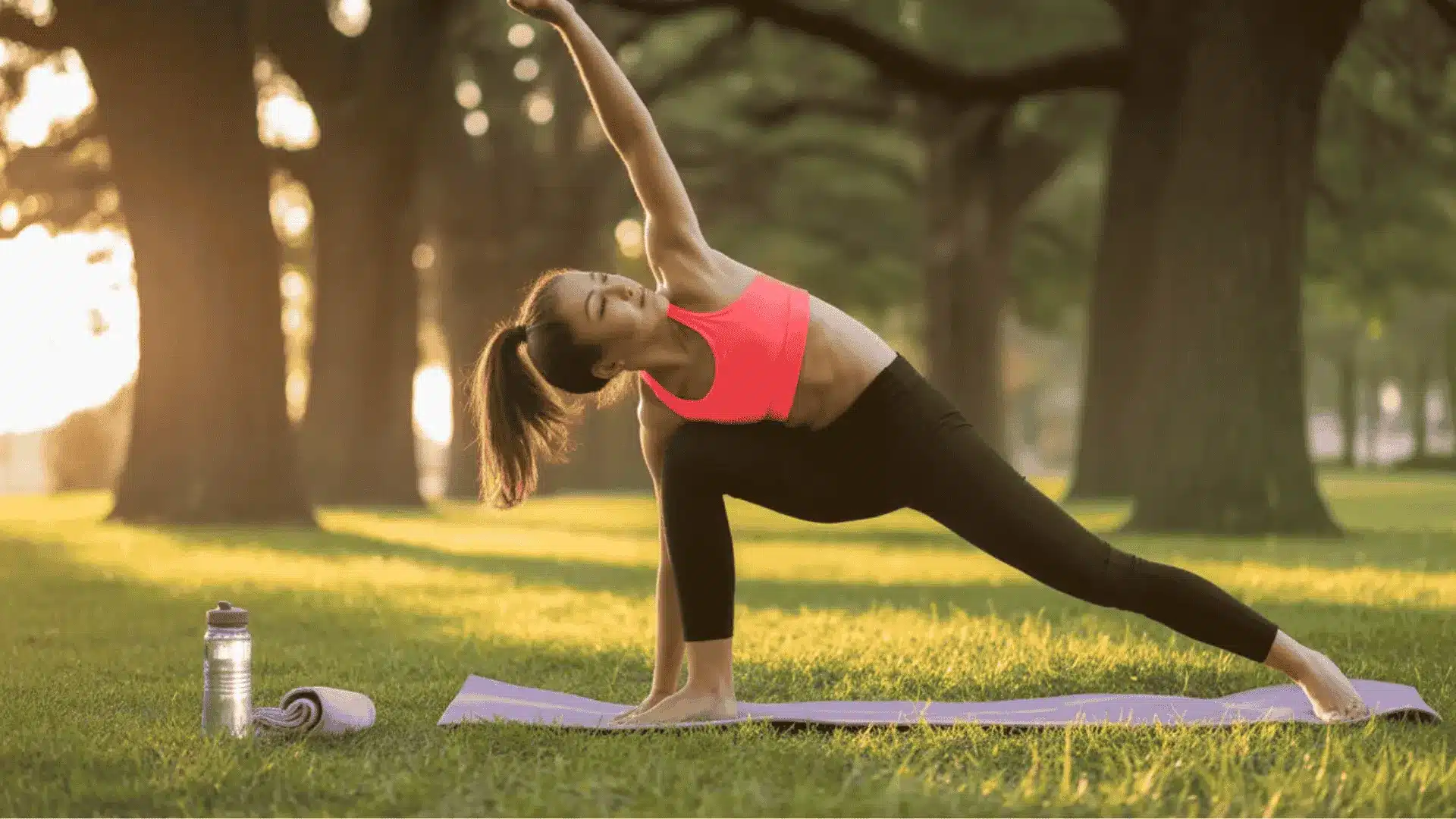I’ve met a lot of people who ask the same question: Is yoga demonic, or is it just harmless stretching? Maybe you’ve asked yourself that too. I get it, on one side, you hear strong warnings about spiritual danger.
On the other hand, you see friends who treat it as a simple exercise. That tension can feel confusing.
In this blog, I want to give you a clear look at what yoga is, what the Bible says about it, and why Christians have such different opinions.
My goal is to help you sort through the noise, think it through with faith in mind, and make a decision that keeps your heart at peace with God.
Is Yoga Demonic?
Believers often disagree. Some see yoga as a spiritual system tied to the worship of other gods. They warn that mantras, salutes, and kundalini claims go against biblical teaching.
Others treat basic stretching and breathwork as neutral when stripped of spiritual cues.
Why Some Say “Yes”?
- Yoga’s roots are tied to Hindu practice.
- Many poses are linked to deity worship.
- Mantras and kundalini claims can be seen as spiritual deception.
- Some former teachers report deep conflict beyond exercise.
Why Others Say “Not Inherently”?
- A lunge or breathing drill is not worship on its own.
- Neutral classes exist with no chants or deity names.
- Conscience, intent, and context matter.
What Does the Bible Say About Yoga?

The Bible never names yoga, but it gives us clear principles that help guide our choices. These truths can help you weigh the practice wisely.
1. Exclusive Worship Belongs to God
Exodus 20:3–5 and 1 Corinthians 10:18–22 emphasize that worship is reserved solely for God. Any practice that includes chants, sun salutations, or rituals associated with other deities conflicts with biblical commands.
When yoga integrates spiritual elements from other religions, it can cross the boundary into forbidden worship. Christians must carefully consider if any part of the practice diverts honor away from God to avoid spiritual compromise.
2. Conscience Matters
Romans 14 highlights that some actions are matters of personal conviction rather than clear commands. One believer may view yoga purely as physical exercise and feel comfortable participating, while another might feel that any connection to its spiritual origins is problematic.
Both positions deserve respect, emphasizing that each person must seek God’s guidance and act according to their conscience, with humility toward differing convictions without passing judgment.
3. Your Body is God’s Temple
1 Corinthians 6:19-20 reminds believers that their bodies are temples of the Holy Spirit and belong to God. Taking care of your health and fitness is important, but it should not involve practices that compromise your spiritual well-being.
Exercise is valuable when it honors God and reflects faithfulness, not when it blends physical benefits with elements contradictory to biblical teachings.
4. Don’t Cause Others to Stumble
1 Corinthians 8:9 cautions believers to consider how their freedoms impact others. Even if yoga feels acceptable to you, if it causes confusion or leads another believer to question their faith or conscience, choosing to abstain might be a more loving and supportive decision.
Christian freedom requires sensitivity and responsibility toward fellow believers to maintain unity in faith.
5. The Deeper Question
Beyond whether yoga is merely good exercise, the Bible encourages us to consider the bigger picture: Does the practice honor God, protect our faith, and support others in theirs?
This holistic approach helps weigh the spiritual implications clearly. The focus is on living faithfully in body, mind, and spirit, ensuring that your choices reflect love for God and care for your community.
Understanding Types of Yoga & Christian’s Concern
Yoga isn’t just one thing. Some parts look like simple exercises, while others include spiritual elements tied to Hindu or New Age beliefs.
This quick guide shows what each part means, the concerns for Christians, and safer ways to approach it.
| Element | What It Is | Christian Concern | Safer Approach |
|---|---|---|---|
| Asanas (poses) | Physical postures for strength/flexibility. | Some sequences (e.g., sun salutation) were acts of worship. | Use neutral names; skip ritual-based flows. |
| Pranayama (breathwork) | Structured breathing exercises. | Linked to “prana” or life force as spiritual energy. | Practice slow breathing without spiritual meaning. |
| Meditation/Mantras | Mental focus using chants/phrases. | Often dedicated to Hindu deities or the universal self. | Replace with prayer/Scripture meditation; ask for silence. |
| Chakra Talk | Belief in body energy centers. | Rooted in Hindu and New Age spirituality. | Avoid classes using chakra language. |
| Teacher Cues | Spoken guidance during class. | Phrases like “inner light” or deity references. | Choose neutral instructors; decline spiritual wording. |
Tip: Ask for a stretch-only class with no chants, mantras, or spiritual language.
Christian Experiences and Testimonies

Christians who’ve tried yoga share vastly different stories; some report troubling spiritual effects, while others describe simple stretching. These differences often come down to key factors:
- the setting (neutral gym versus spiritually decorated studio),
- the instructor’s approach (fitness-focused versus spiritually-oriented),
- personal intent (exercise only versus spiritual openness), and level of exposure (occasional stretching versus regular chanting or meditation practices).
If you’d like to read personal accounts, there’s a helpful Reddit discussion: Why do evangelical Christians warn against doing yoga? where believers share both concerns and neutral experiences with the practice.
Practical Christian Decision Framework
Before joining any yoga or aerial yoga class, ask these questions to make a faith-aligned decision:
About the Class:
1. Is this taught as pure fitness, or does it include spiritual elements?
2. What language is used: any Sanskrit terms, chants, or references to chakras/energy?
3. Can you skip the spiritual parts without causing disruption?
4. How does the class start and end, with meditation, visualizations, or dedications?
About Your Response:
5. How do you feel afterward, at peace with God or spiritually uneasy?
6. Are you curious about exploring spiritual aspects you hadn’t planned to?
7. Does this practice draw you closer to Christ or create spiritual confusion?
Remember: Your decision should honor God, protect your faith, and bring peace to your heart. What works for one Christian may not work for another, and that’s okay.
Safer Alternatives and Modifications
If you’re interested in the physical benefits of aerial yoga but have concerns about its spiritual aspects, there are several ways to adapt your practice or find alternative approaches that focus purely on fitness and movement.
| Option | What It Involves | Why It’s Safer |
|---|---|---|
| Alternatives | Pilates, mobility classes, strength + stretch routines, or physical therapy sessions. | Provide flexibility and strength benefits without spiritual practices. |
| At-Home Flow (20 Min) | Lunges, hamstring stretch, hip hinge, thoracic rotations, ankle mobility drills, and diaphragmatic breathing. | Simple routine you can do privately with no added spiritual content. |
| Modifications | Rename poses (e.g., “lunge stretch” instead of “warrior”), avoid sun salutations, and skip chants. | Keeps movements neutral and focused on fitness only. |
These options let you gain the physical benefits of stretching and mobility without the spiritual concerns tied to yoga.
Pastoral Care and Community
Finding clarity about yoga, or any practice tied to faith, can feel complicated. If you’re wrestling with doubts, it helps to approach the matter prayerfully and with wise counsel.
- Talk to a pastor or trusted mentor if you feel unsure about yoga
- If you began and now feel conflicted, it is okay to step back
- Use the time instead for prayer, reading Scripture, or taking a walk
- Respect others who reach different conclusions, as Romans 14 calls for charity in matters of conscience
These steps remind us that faith decisions are often personal and should be rooted in both conviction and grace. No matter where you land, seek peace in God’s presence and extend kindness toward others walking a different path.
Wrapping Up
Throughout this post, I’ve shared different perspectives on whether yoga is demonic and why Christians have such varied responses to this question.
I’ve walked you through biblical principles, addressed the genuine concerns many believers raise, and acknowledged how some people simply see yoga as stretching exercises. You’ve also seen practical steps for making thoughtful decisions, plus alternative options if you want the physical benefits without any spiritual elements.
My hope is that you now feel more equipped to work through this decision for yourself. Whatever you choose should honor God, protect your faith, and give you peace in your heart.
What’s your take on this? Drop a comment; I’d love to hear your story and continue this conversation!








